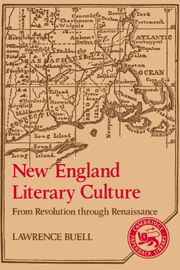Book contents
- Frontmatter
- Contents
- Acknowledgments
- Abbreviations of Frequently Cited Works
- PART I FOUR OVERVIEWS
- PART II THREE REPRESENTATIVE GENRES
- PART III REINVENTING PURITANISM: THE NEW ENGLAND HISTORICAL IMAGINATION
- 8 The Concept of Puritan Ancestry
- 9 The Politics of Historiography
- 10 Fictionalizing Puritan History: Some Problems and Approaches
- 11 Hawthorne and Stowe as Rival Interpreters of New England Puritanism
- Part IV NEW ENGLAND AS A COUNTRY OF THE IMAGINATION: THE SPIRIT OF PLACE
- Postscript
- Appendix Vital Statistics: A Quantitative Analysis of Authorship as a Profession in New England
- Notes
- Index
10 - Fictionalizing Puritan History: Some Problems and Approaches
Published online by Cambridge University Press: 15 October 2009
- Frontmatter
- Contents
- Acknowledgments
- Abbreviations of Frequently Cited Works
- PART I FOUR OVERVIEWS
- PART II THREE REPRESENTATIVE GENRES
- PART III REINVENTING PURITANISM: THE NEW ENGLAND HISTORICAL IMAGINATION
- 8 The Concept of Puritan Ancestry
- 9 The Politics of Historiography
- 10 Fictionalizing Puritan History: Some Problems and Approaches
- 11 Hawthorne and Stowe as Rival Interpreters of New England Puritanism
- Part IV NEW ENGLAND AS A COUNTRY OF THE IMAGINATION: THE SPIRIT OF PLACE
- Postscript
- Appendix Vital Statistics: A Quantitative Analysis of Authorship as a Profession in New England
- Notes
- Index
Summary
As we may by now be tired of hearing, language, in representing reality, most forcefully demonstrates reality's absence.
George Levine, The Realistic Imagination (1981)When art emerges from the self-awareness of a social group and communicates to those outside it, certainly knowledge of a form of consciousness, of experience, of self-understanding different from our own is transmitted. … It is important, however, to be clear about what we are learning, what kind of truth is refracted in this way. It is a communication of subjectives and appearances, not of analytic understanding, for which fiction can be no more than evidence.
Jeffrey Sammons, Literary Sociology and Practical Criticism (1977)In this chapter and the next, we turn from historical accounts of the Puritan past to a more direct study of belletristic portrayals. As we do, the task of understanding the historical dimension of period thinking becomes trickier than ever. If self-styled works of history often seem more like the reflections of fancy than of fact, the relationship between a piece of creative writing and its historical referent is even more elusive. A work of history is already a textualization of the original phenomena. A work of historical fiction is, then, a combination of retextualized source material and artistic elaboration (mediated by literary convention, of course). Small wonder that theories of historical fiction do not agree as to whether such writing can meaningfully be defined in terms of the sort of historical knowledge it furnishes.
- Type
- Chapter
- Information
- New England Literary CultureFrom Revolution through Renaissance, pp. 239 - 260Publisher: Cambridge University PressPrint publication year: 1986



